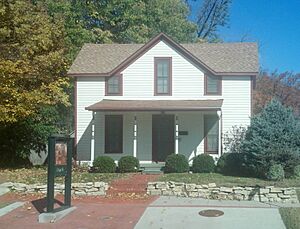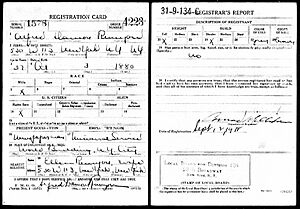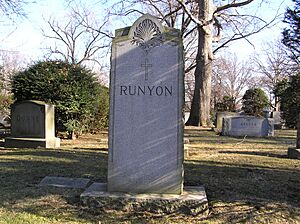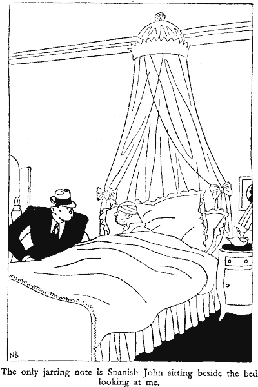Damon Runyon facts for kids
Quick facts for kids
Damon Runyon
|
|
|---|---|
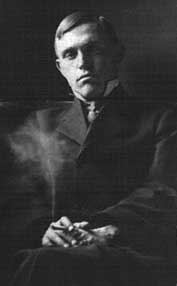 |
|
| Born |
Alfred Damon Runyan
October 4, 1880 Manhattan, Kansas, U.S.
|
| Died | December 10, 1946 (aged 66) New York City, U.S.
|
| Occupation | Writer, journalist |
| Years active | 1900–1946 |
Alfred Damon Runyon (born October 4, 1880 – died December 10, 1946) was a well-known American journalist and writer of short stories.
He is most famous for his short stories about the exciting world of Broadway in New York City. These stories became popular during the Prohibition era, a time when alcohol was illegal. When people in New York thought of a "Damon Runyon character," they pictured a unique person from Brooklyn or Midtown Manhattan.
The word Runyonesque describes these special characters. It also refers to the funny situations and conversations Runyon wrote about. He created humorous and heartwarming tales about gamblers, actors, and even gangsters. His characters often had colorful nicknames like "Nathan Detroit" or "Harry the Horse."
Runyon's unique writing style is called Runyonese. It mixes formal language with lively slang. He almost always wrote in the present tense and avoided using contractions like "don't" or "can't."
Many people know Runyon's fictional world through the musical Guys and Dolls. This popular musical is based on two of his stories, "The Idyll of Miss Sarah Brown" and "Blood Pressure." The movie Little Miss Marker also came from one of his short stories. It was so popular that it was remade three times!
Besides writing stories, Runyon was a newspaper reporter for many years. He covered sports and general news for different publications owned by William Randolph Hearst. He was known for his special "present tense" articles, like the one he wrote about Franklin Delano Roosevelt becoming president in 1933.
Contents
Damon Runyon's Early Life
Damon Runyon was born Alfred Damon Runyan in Manhattan, Kansas. His family had many newspaper people. His grandfather was a newspaper printer, and his father edited a newspaper in their town.
In 1882, his family moved west. They finally settled in Pueblo, Colorado, in 1887. Damon Runyon spent most of his childhood there. He only went to school until the fourth grade. He started working in the newspaper business with his father in Pueblo. Today, places like Runyon Field and Runyon Lake in Pueblo are named in his honor.
Joining the Military
In 1898, when he was still a teenager, Runyon joined the U.S. Army. He fought in the Spanish–American War. While in the army, he wrote for military newspapers like the Manila Freedom.
Becoming a Newspaper Reporter
After his time in the military, Runyon worked for newspapers in Colorado. His first reporting job was in September 1900 for the Pueblo Star. He worked in the Rocky Mountain area for about ten years. At the Denver Daily News, he was the "sporting editor," which we now call a "sports editor."
At one newspaper, his last name was accidentally spelled "Runyon" instead of "Runyan." He decided to keep the new spelling.
In 1910, Runyon moved to New York City. His first article there was signed "Damon Runyon." For the next ten years, he covered the New York Giants baseball team and professional boxing for the New York American.
He became a famous baseball writer for the Hearst newspapers starting in 1911. He was great at noticing interesting and unusual things in sports. This changed how baseball was reported. He even received the J. G. Taylor Spink Award in 1967 for his excellent baseball writing. He is also in the International Boxing Hall Of Fame.
Runyon's Love for Gambling
Gambling, especially on craps or horse races, was a common topic in Runyon's stories. He himself loved to gamble. He once famously said, "The race is not always to the swift, nor the battle to the strong, but that's how the smart money bets." This means that even if someone is fast or strong, the smart bet is often on the one who is expected to win.
Damon Runyon's Personal Life
In New York City, Damon Runyon married Ellen Egan. They had two children, Mary and Damon Jr. In 1928, Ellen and the children moved away from Runyon.
Later, Runyon met a young woman named Patrice Amati del Grande. She was a messenger girl at a racetrack in Mexico. Runyon paid for her to go to school. After she graduated, she came to New York City. They fell in love and got married in 1928. His first wife, Ellen, passed away in 1931.
In 1946, Runyon and Patrice divorced.
Damon Runyon's Death
Damon Runyon died in New York City in late 1946. He was 66 years old. He had been diagnosed with throat cancer two years earlier. He lost his ability to speak due to the illness.
His body was cremated. His ashes were scattered over Broadway in Manhattan from an airplane. This was a special way to honor him. His family's burial plot is in Woodlawn Cemetery in New York.
In his will, Runyon left his house in Florida and money to his second wife. He also split the money from his writings between his children and Patrice.
Damon Runyon's Legacy
- After Runyon passed away, his friend Walter Winchell started the Damon Runyon Cancer Memorial Fund. This fund helps support scientific research to find cures for cancer.
- The first-ever telethon, a long TV fundraiser, was hosted by Milton Berle in 1949 to raise money for the Damon Runyon Cancer Research Foundation.
- The Denver Press Club gives out the Damon Runyon Award each year to a famous journalist.
- Damon Runyon Elementary school in Littleton, Colorado, is named after him.
- The Damon Runyon Stakes is a horse race held every December. Runyon loved horse racing and even owned some horses.
- A block of West 45th Street in Manhattan is named Runyon's Way.
- The house where Runyon was born in Manhattan, Kansas, is a historic place.
Damon Runyon's Writing Style: The "Broadway" Stories
Damon Runyon's stories are known for their clever plots and surprising endings. But what really made them special was the way he told them. He created a unique language for his characters.
Runyon almost always used the present tense in his stories. For example, instead of saying "he was," he would say "he is." He also avoided words like "don't" or "can't." This made his writing sound very formal and funny at the same time.
He used many slang terms that he didn't explain, such as:
- pineapple = a grenade
- roscoe = a gun
- shiv = a knife
- noggin = head
- snoot = nose
He also used many repeated phrases, like:
- ever-loving wife
- more than somewhat
- loathe and despise
Runyon's stories are usually told by a character who is never named. This character knows many gangsters but doesn't seem to be involved in any crimes himself. He just seems to be "around" and watching everything happen.
Damon Runyon's Literary Works
Books
Poems
- The Tents of Trouble (1911)
- Rhymes of the Firing Line (1912)
Story Collections
- Guys and Dolls (1932)
- Blue Plate Special (1934)
- Money From Home (1935)
- More Than Somewhat (1937)
- Furthermore (1938)
- Take It Easy (1938)
- My Wife Ethel (1939)
- My Old Man (1939)
- Runyon à la Carte (1944)
- In Our Town (1946)
Collected Newspaper Columns
- Short Takes (1946)
Plays
- A Slight Case of Murder (with Howard Lindsay, 1940)
Stories
Runyon wrote many short stories. Some of his most famous ones are called "Broadway" stories. These stories are set in the exciting world of New York City. He also wrote "Our Town" stories, which are short tales about life in a small town, often based on his own experiences.
Some of his well-known stories include:
- "Breach of Promise"
- "Romance in the Roaring Forties"
- "Blood Pressure"
- "The Bloodhounds of Broadway"
- "Little Miss Marker"
- "The Idyll of Miss Sarah Brown"
- "Dancing Dan's Christmas"
Film Adaptations
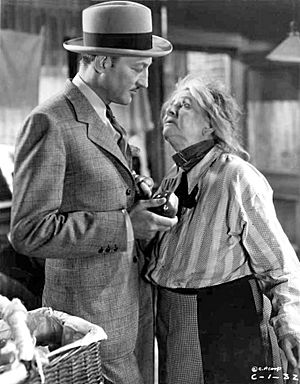
Twenty of Damon Runyon's stories were made into movies. Here are some of the most famous ones:
- Lady for a Day (1933): This movie was nominated for several Academy Awards. It was remade as Pocketful of Miracles in 1961 and again by Jackie Chan in 1989 as Miracles.
- Little Miss Marker (1934): This film helped make Shirley Temple a huge child star. It was remade several times, including Sorrowful Jones (1949) with Bob Hope.
- The Lemon Drop Kid (1934): Remade in 1951 with Bob Hope. This version introduced the famous Christmas song "Silver Bells".
- A Slight Case of Murder (1938): A comedy starring Edward G. Robinson.
- The Big Street (1942): Starring Henry Fonda and Lucille Ball.
- Guys and Dolls (1955): A very popular musical film starring Marlon Brando, Jean Simmons, and Frank Sinatra. It was based on Runyon's stories "The Idyll of Miss Sarah Brown" and "Blood Pressure."
Plays and Musicals
- A Slight Case of Murder (1935): A play he co-wrote for Broadway.
- Guys and Dolls (1950): A famous Broadway musical based on his stories.
Radio and Television
- The Damon Runyon Theater was a radio series that told 52 of his short stories. It ran from 1948 to 1949.
- Damon Runyon Theatre was a TV show that aired from 1955 to 1956.
See also
 In Spanish: Damon Runyon para niños
In Spanish: Damon Runyon para niños
 | Anna J. Cooper |
 | Mary McLeod Bethune |
 | Lillie Mae Bradford |


